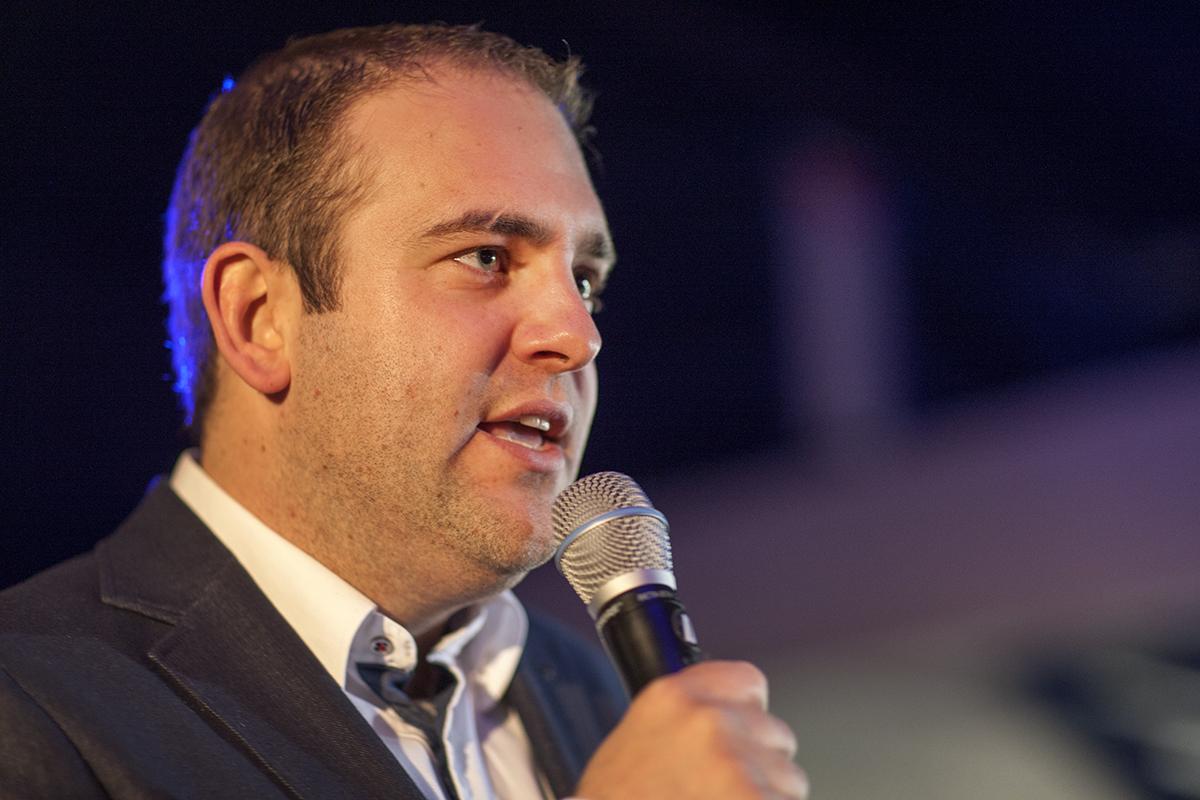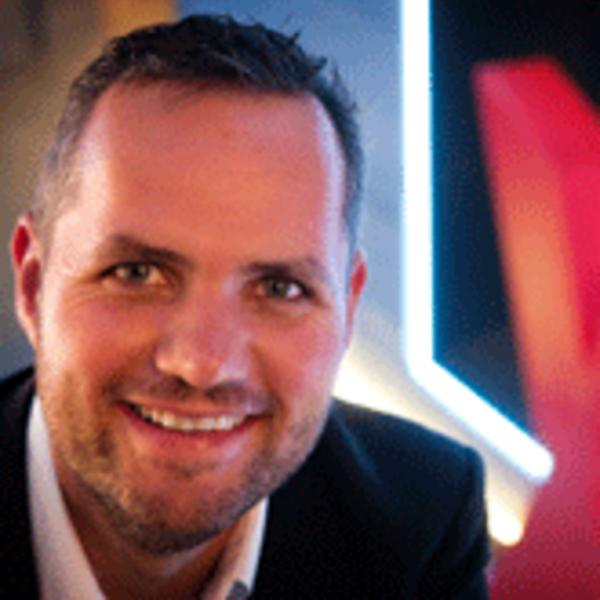Entrepreneur and Engineer
Internet of things, it is a word often used these days. But how do you apply it to improve the life of the refugees that dominate the world news? Dick Klaassen is inspired by this subject and it shows in his talks. During the second Gulf War he guarded the border between Turkey and Iraq and later served in Afghanistan. He saw what conflict can do to people. After 11 years he ended his career in the Air force. Because as he explains with wide gestures: “I’d rather go to places where people want my help.”
Deploying internet of things in refugee camps, Dick wants to get a “camp in the cloud” using LoRa technology. If that wasn’t enough he aims to do it using something he calls Symbiotic Entrepreneurship. What that means and how he plans to do it, you will learn from his talk.
Dominique Troisfontaine
Student
Why do we treat people with dyslexia as less intelligent than other people in the Netherlands? Dominique Troisfontaine experienced it himself when a teacher called him dumb in elementary school. Looking back at it, he might need to thank the teacher. Because it made him all the more determined to prove himself.
At this moment the 24 year old Dominique is a student at HAS. During his internships in Canada and Finland Dominique experienced a different culture, where people had a completely different approach to dyslexia. “Here everybody wants to put you in box and try to solve problems or move forward within that box. In Finland and Canada the goal is to move forward with the whole class together. It was a group effort and not that of one individual”.
New cultures taught Dominique to look at how he interacts with people. He has found some great insights about dyslexia and how to deal with it, which he wants to share with you in his talk.
Elissar Eliwi
Refugee
“In 2011 my world collapsed,” says Elissar. “From being a graduate of English literature in a university, and working for a big international company, I ended up without a home and in line for food.” The content of her talk will be surprisingly positive although she knows what suffering is.
When she was forced to leave her old life behind, Elissar struggled to fit into a new world. Her hobbies are those of a regular young woman: dancing, reading, biking and walking. So when she saw people dancing in the streets of Venlo, she decided to join in. A few moments later she was taken by the hand and started building her first carnival truck.
Enjoying the carnival in Venlo and the kindness of people around her, Elissard realized that she has the power to change her surroundings. And so, she wants to change the lives of a generation of youngsters whom will be the real change of future.
Gaston Dorren
Journalist and writer
As a journalist and writer Gaston has a lot of linguistic experience. But in terms of experience, he says, there’s nothing like staying abroad. In Peru and Ecuador, speaking Spanish was the best and often the only way to communicate with people who lived completely different lives. “By learning another language, you make your world bigger, more diverse and less scary.” More about the delights and surprising effects of bilingualism in his talk.
The evolution of languages is an ongoing process, and huge changes can be expected in decades to come. “Young people want to distinguish themselves from the generation before them, and changing the language is a great way to do that, especially as it annoys older people no end.” Among adults, women tend to be leading in language change. So when it comes to language, adult men are mostly followers? “Yes, we are. And often grumpy ones at that.”
Guido Stompff
Design Thinker
In 2005 I attended a lecture delivered by a famous Dutch politician. To be honest, he made me angry,” Guido says. “He was explaining how difficult politics are, talking about the dilemmas he faces every day. But he did not present solutions. Not one. And not even a plan to get one.” In his anger Guido, a designer with many years of experience, suddenly understood he had an entirely different way of thinking. Designers always explore new ideas. Problems are challenges for their creativity.
His anger became wonder. “I asked myself what makes design thinking so different. And above all what it might contribute to teams and companies. And even politics.” Together with the Technical University Delft he made movies of product development teams in the wild, and analyzed these with 7 researchers. They discovered how ideas arise in teams, captured the origins of innovation and revealed what designers contribute.”
Loes Keijsers
Assistant professor
With their eye-rolling and grumpiness, adolescents are experts in annoying their parents. Loes Keijsers, assistant professor at Tilburg University, aims at improving the lives of teens and parents. “The ‘terrible two’s’ are notorious, but when you ask parents what – in hindsight- was the most difficult phase of raising children, most of them say the ‘terrible teens’.”
Unfortunately, we still haven’t figured out what the magic formula for raising teenagers is. As most scientific research on parenting is based on surveys among large samples, findings tap into group averages.
“What is really needed is obtaining scientific knowledge about how parenting advice can be tailored to the unique needs and strengths of an individual family.” Loes presents a novel paradigm in parenting research, to unleash possibilities of family-specific parenting advice. Could this be the next (r)evolution in teen psychology?
Entrepreneur and healthcare worker
From studying psychology and dual diagnostics Patrick worked in different roles at GGZ for many years. He was surprised by the fact that treatments for addicts were stopped when they fell back into old habits. “You don’t stop a psychological treatment when someone has an episode, why do we stop the treatment for addicts?”
Patrick developed a no-nonsense treatment which addresses every part of a sick person’s life. Not just the illness but also everything that illness has destroyed, from financial issues to personal life. “There is a trend of ‘pleasing’ in the healthcare system, making the patient a shared decision maker. We shouldn’t bend the rules. We try to help a client but at the same time we hold on to the same rules that apply for ourselves. This way the client rehabilitates better.” Patrick shows amazing results with his treatment method. What those results are, you’ll hear in his talk.
Peter Bloemers
Volunteery Fire Fighter
At this point the fire department is almost at a point-of-no-return considering their volunteer base, which is essential to the effectiveness of the department. The finding and connecting of volunteers to the fire department seems to be a difficult job and becomes increasingly worrisome. If things keep going as they are, the fire department might get trouble gearing up and moving out.
Binding volunteers to your organization isn't easy, but Peter Bloemers has found a solution to this problem. "The fire department is a public responsibility where everyone should be able to rely on. To assure the safety of the population, the department needs to evolve!"
Peter has been a volunteer at the fire department, in one way or another, from the age of 10. Today he's the commander of the department in Belfeld."My lesson? If you want to evolve, you also need to look at the past. That's where I found the explanation and solution for the fire department problem".
Mayor of the Municipality of Beesel
“I’m convinced we are very fortunate with this region.”, says mayor of Beesel Petra Dassen. “As leaders, we have a responsibility to make sure we achieve the best results. To do this we all need each other: entrepreneurs, government, small towns, cities, citizens, politicians, schools and companies. We need to work together.”
The study ‘politics’ in Aken, Germany, fits Petra like glove. From even a young age she couldn’t resist the urge to improve her environment. The promotion which followed concerned a deepening of learning processes. “When I finished my thesis it really felt like a personal triumph.” The activism, reflection and further deepening of knowledge came by different positions she held.
“Personal growth I found most in motherhood and being a mayor. Motherhood teaches you the world revolves around others. Being a mayor brought me the rich feeling of being connected to the people my town.”
Remko Killaars
Teacher in Industrial Product Design
Remko is a lecturer with a vision on design and art. “What makes something beautiful?” Remko asks. “And is esthetic value a functionality?” Remko inspires his students and us with a view on design that is clever and simple at the same time.
As a designer, photographer and drawing artist Remko is constantly boosting his creative mind. “I have really put my hobby into my job.” But as a designer I missed interaction, which as a teacher I now have plenty. He calls a moment during his study at the design academy as defining in his journey. A teacher said his work was not good, but couldn’t quite tell in what way. “Judging art is really hard. But it has to be transparent.”
When we look at the future the role of the designer changes, since technology will make it easier for consumers to take over part of the design process. The designer becomes an advisor. “We need to move from a product orientation to solution based orientation."
Stephan Ummelen
Marketeer
Organizations tend to get lost in what they think is expected from them, instead of sticking to what they stand for. Stephan Ummelen believes that value driven companies are better companies: “When I realized this, I quit my job as a CEO at an advertizing agency and started to focus exclusively on values in organizations”.
“My own moment of evolution came when I realized that everybody is taught to be like others while others tend to like people that are themselves. Since then, I have tried to focus on that which inspires me”.
Currently, Stephan does international research on the authenticity of core values at large organizations and is partner at a small consultancy focussed on value driven organizations. He is 33, likes philosophy, and lives together in Nijmegen with his girlfriend and their Dachshund.
Entrepreneur and Engineer
Willem-Jan’s passion is building something from scratch while trying to do the impossible. “You need to follow your own path in life”, Willem-Jan says. After studying mechanical engineering at HTS Venlo and Automotive Engineering Science at TU Eindhoven, Willem-Jan started his career at a large truck manufacturer.
“It started out as a really cool job. But unfortunately, due to the financial crisis, it became a drag which made me less and less motivated. When even the plants had to be removed due to budget cuts I decided to quit my job and follow my passion and start my own business. This was probably the single most important decision in my professional life.”

